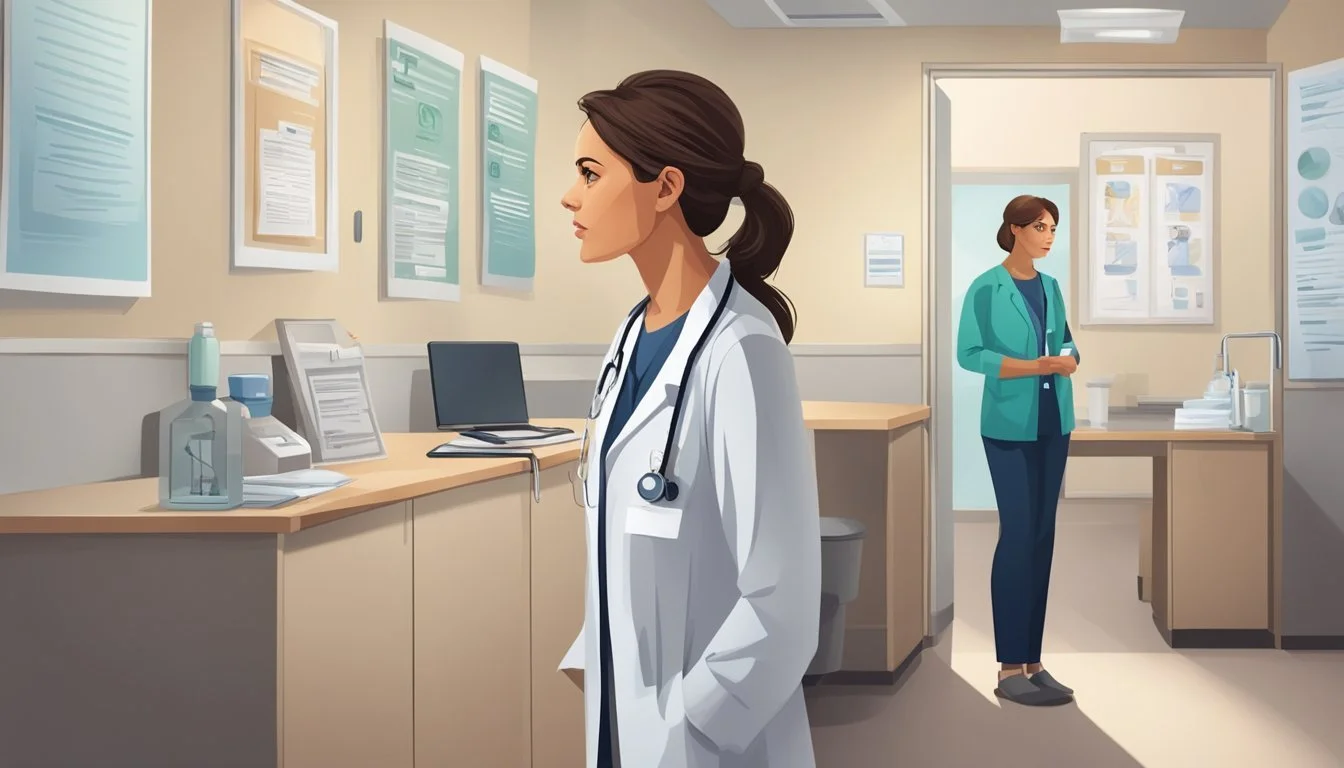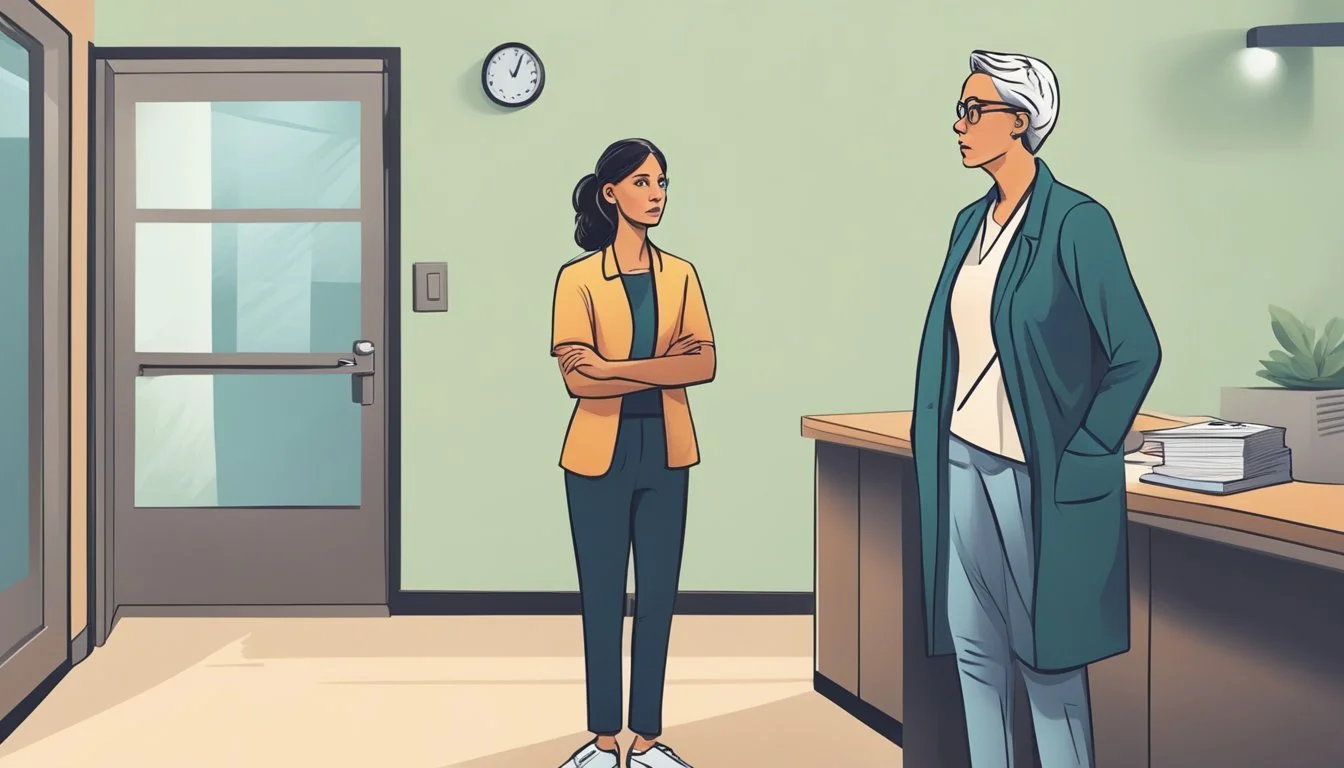Gaslighting in Women's Health: Your Symptoms Are Real, Not Imagined
Women seeking medical care often face a troubling phenomenon: their health concerns are dismissed, downplayed, or attributed to psychological factors. This experience, known as medical gaslighting, leaves many female patients feeling frustrated and unheard.
Medical gaslighting disproportionately affects women, with their symptoms frequently labeled as anxiety, stress, or "normal" discomfort. Heart disease may be misdiagnosed as anxiety, while severe menstrual pain could be dismissed as typical. This pattern of dismissal can lead to delayed diagnoses and inadequate treatment for serious conditions.
The healthcare system's tendency to minimize women's health issues stems from deeply rooted gender biases. Studies show that women are more likely than men to report feeling treated differently by medical professionals due to their gender. Addressing this disparity requires increased awareness among healthcare providers and empowering women to advocate for their health needs.
Understanding Gaslighting in Health Care
Gaslighting in health care involves dismissing or minimizing patients' symptoms and concerns. This practice disproportionately affects women and can lead to misdiagnosis, delayed treatment, and psychological distress.
Defining Gaslighting and Medical Gaslighting
Gaslighting is a form of manipulation that causes someone to question their own perceptions and reality. In medical contexts, it occurs when healthcare providers dismiss, downplay, or disbelieve patients' reported symptoms.
Medical gaslighting often involves telling patients their issues are "all in their head" or attributing physical symptoms to psychological causes without proper investigation. This can result in missed diagnoses and inadequate treatment.
Women frequently encounter medical gaslighting when seeking care for conditions like chronic pain, autoimmune disorders, or reproductive health issues.
History and Evolution of Gaslighting
The concept of gaslighting originates from a 1938 play and subsequent film adaptations. In medicine, similar dismissive attitudes have long affected women's health care.
Historically, the diagnosis of "female hysteria" exemplified medical gaslighting. Doctors attributed a wide range of women's health complaints to supposed uterine dysfunction or emotional instability.
While hysteria is no longer a recognized diagnosis, its legacy persists in subtle forms of gender bias and skepticism towards women's health concerns.
Gender Bias and Health Care
Gender bias in health care contributes to the prevalence of medical gaslighting experienced by women. Research shows that healthcare providers often perceive women's pain as less severe than men's and are more likely to attribute women's symptoms to emotional or psychological causes.
This bias can lead to:
Delayed diagnoses for serious conditions
Inadequate pain management
Dismissal of reproductive health concerns
Underrepresentation of women in medical research
These factors collectively contribute to poorer health outcomes for women across various medical specialties.
Psychosomatic Labels in Women's Health
The use of psychosomatic labels in women's health care is a common form of medical gaslighting. Healthcare providers may hastily attribute physical symptoms to stress, anxiety, or depression without thorough investigation.
Conditions often labeled as psychosomatic in women include:
Chronic fatigue syndrome
Fibromyalgia
Endometriosis
Autoimmune disorders
This approach can lead to missed diagnoses of serious physical conditions and leave women feeling invalidated and frustrated. It's crucial for healthcare providers to consider both physical and psychological factors when evaluating symptoms, rather than defaulting to psychosomatic explanations.
The Impact of Gaslighting on Women's Health
Medical gaslighting can have severe consequences for women's physical and mental wellbeing. It often leads to delayed diagnoses, inadequate treatment, and worsening health outcomes across various medical fields.
Mental Health Repercussions
Women who experience medical gaslighting may develop anxiety, depression, and self-doubt. The constant dismissal of their symptoms can erode their confidence in their own perceptions. This can lead to hesitation in seeking further medical care, even when needed.
Some women report feeling isolated and misunderstood after multiple encounters with dismissive healthcare providers. The stress of fighting to be heard and validated can exacerbate existing mental health conditions or trigger new ones.
Chronic Pain and Autoimmune Disorders
Chronic pain conditions and autoimmune disorders disproportionately affect women. When doctors attribute these symptoms to psychological causes, proper diagnosis and treatment are delayed.
For example, endometriosis patients often wait years for a correct diagnosis. During this time, the condition can progress, leading to increased pain and potential fertility issues. Similarly, autoimmune disorders like lupus or rheumatoid arthritis may be misdiagnosed as depression or anxiety.
This delay in proper care can result in irreversible damage to organs and tissues, significantly impacting quality of life.
Cardiology and Sex Differences
Heart disease is the leading cause of death for women, yet it is often misdiagnosed or overlooked. Women's heart attack symptoms can differ from men's, leading to misinterpretation by medical professionals.
Women may experience:
Shortness of breath
Nausea
Back or jaw pain
Fatigue
Instead of recognizing these as potential cardiac symptoms, doctors might attribute them to anxiety or stress. This oversight can result in delayed treatment for coronary heart disease, potentially leading to more severe cardiac events or even death.
Research shows that women are less likely to receive aggressive treatment for heart conditions compared to men with similar symptoms. This disparity highlights the need for increased awareness of sex differences in cardiology.
Gaslighting Across Demographics
Gaslighting in women's health affects various groups differently, with intersecting factors like race, age, and socioeconomic status playing significant roles. These disparities lead to unique challenges for specific demographics seeking medical care and validation.
Women of Color and Medical Treatment
Women of color face compounded challenges when seeking medical care. Racial biases in healthcare often result in their symptoms being dismissed or underestimated. Studies show that Black women are less likely to receive pain medication compared to white women with similar conditions.
Cultural differences can also lead to misunderstandings between patients and healthcare providers. This gap may cause symptoms to be misinterpreted or overlooked entirely.
Language barriers for non-native English speakers can further complicate accurate diagnosis and treatment. Interpreters are not always available, leading to miscommunication and potential misdiagnosis.
Age-Related Dismissal in Women's Health
Young women often struggle to have their health concerns taken seriously. Doctors may attribute symptoms to stress, hormones, or lifestyle factors without thorough investigation.
Conversely, older women face different challenges. Menopausal symptoms are frequently downplayed or normalized, leading to inadequate treatment.
Age-related stereotypes can result in cognitive complaints being dismissed as "senior moments" rather than potential neurological issues. This dismissal can delay crucial diagnoses and interventions.
Healthcare providers may also overlook sexual health concerns in older women, assuming diminished interest or importance.
The Role of Socioeconomic Factors
Lower-income women often face greater obstacles in accessing quality healthcare. Limited options for medical providers can result in rushed appointments and superficial examinations.
Financial constraints may lead to delayed seeking of medical attention, allowing conditions to worsen before treatment. This delay can make symptoms more complex and challenging to diagnose accurately.
Education level can impact a patient's ability to advocate for themselves effectively. Women with less formal education may struggle to articulate their symptoms or challenge a doctor's dismissal.
Insurance status plays a crucial role in treatment quality. Uninsured or underinsured women may receive less thorough care or face pressure to minimize symptoms to avoid costly procedures.
Identifying Gaslighting in Medical Settings
Medical gaslighting occurs when healthcare providers dismiss or downplay patients' symptoms and concerns. Recognizing the signs and advocating for oneself are crucial steps in addressing this issue. Seeking additional medical opinions can help validate experiences and ensure proper care.
Signs and Symptoms of Gaslighting
Patients may experience several indicators of medical gaslighting. Healthcare providers might consistently interrupt or talk over them during appointments. They may dismiss symptoms as "all in your head" or attribute them solely to stress or anxiety without proper investigation.
Some doctors might refuse to order necessary tests or disregard abnormal results. They may also make patients feel guilty for seeking medical attention or questioning their diagnosis.
Minimizing pain or discomfort is another common tactic. Providers might compare a patient's symptoms to those of others, implying they're overreacting.
Patients often leave appointments feeling confused, frustrated, or invalidated. They may start doubting their own experiences and perceptions of their health issues.
Gaslighting Test and Self-Advocacy
Recognizing gaslighting is the first step towards self-advocacy. Patients can use a mental "gaslighting test" to evaluate their medical interactions:
Do I feel heard and respected during appointments?
Are my concerns taken seriously and addressed thoroughly?
Does the provider explain things clearly and answer my questions?
Am I comfortable expressing disagreement or asking for clarification?
Self-advocacy involves:
Documenting symptoms and concerns before appointments
Bringing a trusted friend or family member for support
Asking questions and requesting explanations for decisions
Expressing discomfort with dismissive responses
Requesting second opinions when necessary
Patients have the right to participate actively in their healthcare decisions and should feel empowered to do so.
Seeking a Second Opinion
When patients feel their concerns are being dismissed, seeking a second opinion can be valuable. This process involves consulting another healthcare provider for an independent evaluation of symptoms, test results, and treatment options.
To obtain a second opinion:
Research specialists in the relevant field
Check if insurance covers second opinions
Request medical records from the current provider
Prepare a list of questions and concerns
Patients should approach the new provider with an open mind, sharing their full medical history and concerns. It's important to compare the new assessment with the original diagnosis and treatment plan.
A second opinion can provide validation, alternative perspectives, or additional treatment options. It empowers patients to make informed decisions about their health and ensures they receive appropriate care.
Strategies to Combat Medical Gaslighting
Women can take proactive steps to advocate for their health and combat medical gaslighting. These strategies empower patients to communicate effectively, seek appropriate care, and navigate the healthcare system with confidence.
Developing an Informed Voice
Preparation is key when addressing health concerns. Women should document their symptoms thoroughly, including frequency, duration, and impact on daily life. Keeping a health journal can provide valuable data to share with healthcare providers. Research reputable medical sources to understand potential conditions and treatment options. This knowledge allows patients to ask informed questions and engage in meaningful discussions with their doctors.
Practicing assertive communication techniques can help women express their concerns clearly. Use "I" statements to describe symptoms and experiences. For example, "I experience severe pain that interferes with my work" is more effective than vague complaints. Be specific about how symptoms affect daily life and persist in seeking answers when concerns are dismissed.
Choosing the Right Specialist
Finding the right healthcare provider is crucial for receiving proper care. Seek recommendations from trusted sources or patient advocacy groups for specialists experienced in treating specific conditions. Research potential doctors' backgrounds, including their areas of expertise and patient reviews.
Consider seeking a second opinion if initial consultations are unsatisfactory. Different specialists may offer alternative perspectives or treatment approaches. Don't hesitate to switch providers if a doctor consistently dismisses concerns or fails to address them adequately.
Establishing a good relationship with a primary care physician can also be beneficial. They can serve as an advocate and help coordinate care between specialists when necessary.
Navigating the Healthcare System Effectively
Understanding patient rights is essential for navigating the healthcare system. Familiarize yourself with laws regarding access to medical records and the right to seek second opinions. Many hospitals and clinics have patient advocates who can assist with concerns or complaints.
Bring a trusted friend or family member to appointments for support and to help remember important information. They can take notes and provide an additional perspective on the interaction with healthcare providers.
Be persistent in following up on test results and referrals. If necessary, escalate concerns to supervisors or medical boards when facing repeated instances of dismissive behavior or inadequate care.
Future Directions in Women's Health
Addressing gaslighting in women's healthcare requires systemic changes across research, education, and policy. Key areas for improvement include clinical trial design, medical training, and advocacy efforts.
Improving Clinical Trials and Research
The National Institutes of Health now mandates the inclusion of women in clinical trials. This policy aims to uncover sex-based differences in drug responses and disease progression. Researchers are developing gender-specific protocols to account for hormonal fluctuations and other female-specific factors.
Some institutions are creating women's health research centers focused on understudied conditions like endometriosis and polycystic ovary syndrome. These centers prioritize patient experiences and collaborate with women's health specialists.
Data analysis techniques are evolving to better detect sex-based differences in trial results. This helps identify treatments that may be more effective for women.
Education and Training for Medical Professionals
Medical schools are updating curricula to include more women's health topics. This covers sex-based differences in disease presentation and treatment responses. Some programs now require rotations in women's health clinics.
Continuing education for practicing doctors emphasizes recognizing and avoiding gender bias. This includes training on active listening and validating patient concerns.
Hospitals are implementing unconscious bias training for all staff. This aims to reduce dismissive attitudes toward female patients' symptoms and complaints.
Policy Changes and Advocacy Efforts
Patient advocacy groups are pushing for legislation to address medical gaslighting. Proposed laws would require documentation of all patient-reported symptoms.
Some states now mandate insurance coverage for second opinions in cases of disputed diagnoses. This gives women more options when they feel dismissed by their doctors.
Health systems are implementing patient feedback systems specific to gender-based experiences. This data informs policy changes and identifies problematic providers.
Professional medical associations are updating practice guidelines to emphasize patient-centered care for women. These guidelines stress the importance of believing and thoroughly investigating women's health complaints.
Personal Stories and Case Studies
Women's experiences with medical gaslighting reveal patterns of dismissal and misdiagnosis. These accounts highlight the importance of persistence and self-advocacy in navigating the healthcare system.
Real-life Experiences with Gaslighting
Sarah, a 32-year-old teacher, visited multiple doctors for severe abdominal pain. Each dismissed her concerns as "just stress" or "normal menstrual cramps." After months of suffering, she insisted on additional tests, which revealed endometriosis.
Another patient, Maria, experienced debilitating fatigue and joint pain. Her symptoms were attributed to depression, despite her protests. It took two years before a rheumatologist diagnosed her with lupus.
These stories illustrate how women's health concerns are often minimized or misattributed to psychological causes. This dismissal can lead to delayed diagnoses and prolonged suffering.
Successful Patient Advocacy
Emily, a software engineer, faced skepticism when describing her heart attack symptoms. Determined to be heard, she brought a detailed symptom log and insisted on tests. Her persistence led to a correct diagnosis and timely treatment.
Lisa, struggling with undiagnosed PCOS, researched her symptoms extensively. Armed with information, she confidently discussed her concerns with a new gynecologist, leading to proper testing and management.
These cases demonstrate the power of informed self-advocacy. Patients who educate themselves and assertively communicate their needs often achieve better outcomes.
Lessons Learned and Moving Forward
Patients stress the importance of trusting one's body and instincts. Many recommend seeking second opinions and bringing a trusted advocate to appointments.
Healthcare providers are increasingly recognizing the impact of gender bias in medicine. Some hospitals now offer training to combat unconscious biases and improve patient communication.
Patient support groups provide valuable resources and validation. These communities help women share strategies for effective healthcare navigation and emotional support.
Documenting symptoms thoroughly and preparing questions before appointments can lead to more productive doctor-patient interactions. This preparation empowers patients to actively participate in their care.
Closing Thoughts
Women's health concerns deserve to be taken seriously. The medical community must recognize and address the biases that lead to dismissing female patients' symptoms and complaints.
Healthcare providers should listen attentively to women and validate their experiences. Training on gender-specific health issues and unconscious bias can help improve care for female patients.
Women can advocate for themselves by being persistent, seeking second opinions, and thoroughly documenting their symptoms. Bringing a trusted friend or family member to appointments may also help.
Support groups and patient advocacy organizations provide valuable resources and community for women facing medical gaslighting. These networks can offer validation and empower women to pursue proper care.
Recognizing manipulative behavior or psychological manipulation by medical professionals is crucial. Patients should trust their instincts if they feel dismissed or belittled.
Ongoing research into women's health issues and sex-based biological differences is essential. This knowledge can lead to better diagnoses and treatments tailored to women's unique needs.
Change requires effort from both patients and providers. By working together, the healthcare system can become more responsive and equitable for women.





